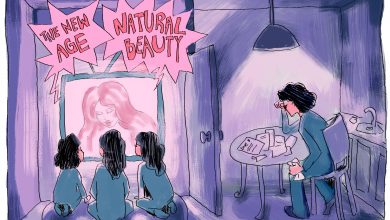Feminism 101: What is Intergenerational Trauma?
The daily traumas experienced by the racialized, colonized, and socioeconomically exploited are not isolated events with a clearly defined start or end.

Illustration by Jenny Dodge
Trauma is defined as a psychologically upsetting experience that has lasting negative effects on a person’s thoughts, feelings, or behaviors. Trauma can manifest on a communal, national, or societal scale as a response to catastrophic loss or rupture. It can also be historical, comprising an enduring communal reaction to events such as genocide or colonization. Intergenerational trauma refers to the transmission of trauma from survivors to subsequent generations.
Trauma can be transmitted across generations through various affective means. Firstly, children may come to identify with the trauma of their caregivers by witnessing and internalizing their caregivers’ suffering. Secondly, victimized individuals may adopt maladaptive parenting styles, such as those marked by violence, distrust, or lack of intimacy. Trauma may also transfer through styles of communication, such as oral storytelling, which can instill a sense of fear in one’s offspring.
One of the best studied examples of intergenerational trauma is the effect of the Holocaust on survivors’ descendants. These descendents are more likely to suffer from mental and emotional issues, reflected in a higher incidence of mood and anxiety disorders.
In addition to affective means, the inheritance of psychological symptoms has underlying biological correlates. Decreased levels of cortisol — a stress hormone that allows the body to return to equilibrium following trauma — have been documented in Holocaust survivors, and more generally, in patients diagnosed with PTSD. Surprisingly, diminished cortisol has also been observed in the children of Holocaust survivors. This hormonal imbalance is part of an epigenetic response, which refers to heritable changes in gene expression that may prepare an offspring for the environment encountered by parents.
It is important to note that trauma, particularly in its intergenerational forms, is of a highly systemic nature and can manifest in a variety of ways. The daily traumas experienced by the racialized, colonized, and socioeconomically exploited are not isolated events with a clearly defined start or end. These violences are persistent, pervasive, and often mundane. Given their larger contexts of sustained racial oppression, even genocides cannot be explained as stand-alone tragedies in the historical record. PTSD and other disorders should be discussed critically with respect to systemic trauma. This is because the medico-scientific pathologization of trauma may legitimize certain forms of trauma over others, imply that trauma is something that can be “fixed,” and locate its source in random tragedy rather than societal dysfunction.
Numerous studies of American Indians and Alaska Natives (AI/ANs) focus on the systemic origins of intergenerational trauma. Though types of historical trauma vary across AI/ANs communities and time, most report a preoccupation with historical and cultural losses. For example, intrusive and recurring thoughts about the loss of tribal traditions often plague individuals. The dominant culture’s failure to adequately address and provide reparations for these losses may hinder communities from “working through” the trauma they endured and continue to endure.
Additionally, these communities suffer continued oppression as a result of institutional racism, microaggressions, physical violence, and threats to cultural identity; the process of colonization did not end in the past, but is rather ongoing. One example is the construction of the Dakota Access Pipeline (DAPL) on Standing Rock Sioux land. The pipeline was originally meant to go through majority-white cities, but residents petitioned for it to be diverted due to safety concerns. Meanwhile, Standing Rock Sioux concerns over water contamination and the destruction of ancestral lands were readily ignored, and subsequent protests were met with police in riot gear. The events at Standing Rock mark a continued colonial legacy of dismissal, exploitation, and militarized violence against Native communities.
The cumulative trauma of past and present-day violences has engendered increased rates of substance abuse and domestic violence — trauma symptoms which cyclically produce and reproduce communal suffering. It is hard to imagine an effective treatment for such traumas that does not fundamentally reorder the oppressive systems in place.
Through concepts such as historical and intergenerational trauma, trauma theorists have made headway in expanding traditional Western definitions of trauma, which privilege experiences of overt physical violence such as assault or war. Nevertheless, the field of trauma studies has been critiqued for its limited Eurocentric trauma paradigm. Critics caution against the lack of cross-cultural ethical engagement, which privileges the suffering of white Euro-American peoples and fails to recognize the suffering of non-Euro-American others. For instance, dominant culture portrays the Holocaust as the primary tragedy of the 20th century, and possibly ever, relegating the trauma associated with various colonial projects to the periphery. The protracted colonization of Algeria by the French, Kenya by the British, and countless other colonial endeavors, are seldom mentioned in the annals of historical trauma. Additionally, trauma theorists must be careful not to universalize notions of trauma and recovery forged in Western contexts when approaching marginalized oppressions.




